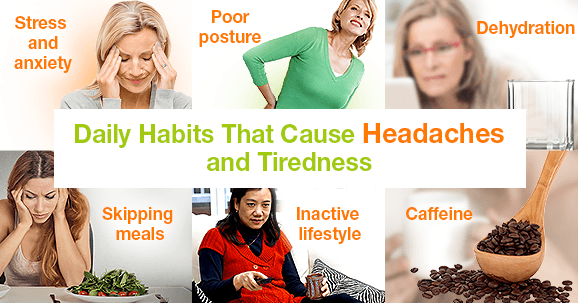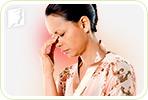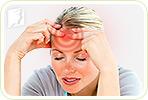Headaches are caused when blood vessels in the brain constantly expand and contract. Tension headaches are the most common and are characterized by dull, nagging pain. Headaches can also turn into unbearable migraines, which are described by severe pain that can last several hours. Tiredness can range from mild daily fatigue to severe exhaustion overall quality of life. Tiredness and headaches are linked because they both are causes of each other, creating a vicious cycle. It is important to stay active and healthy in order to prevent headaches and tiredness.
Causes of Headaches and Tiredness
While each person experiences their own individual triggers, some bad habits commonly lead to headaches and fatigue. These include:
Stress and anxiety
Letting stress and anxiety build up - whether at work or at home - is unhealthy and is a direct cause of headaches and tiredness.
Poor posture
Slouching over a desk all day at work or at home allows tension to accumulate in the neck and shoulders, causing headaches. It is important to try to get up and walk around every so often, and practice good posture when sitting.
Dehydration
Forgetting to drink plenty of water is a crucial mistake many adults make. Dehydration is one of the primary causes of headaches and fatigue.
Skipping meals
Blood sugar levels plummet when you skip meals, which causes headaches and tiredness. It is vital to eat healthy, balanced meals and snacks often to stay alert and prevent headaches.
Inactive lifestyle
Living a sedentary lifestyle can lead to numerous health problems, like obesity, depression, anxiety, and chronic fatigue.
Caffeine
Caffeine can be beneficial in moderation; however, chain-drinking it can cause headaches because it dehydrates the body. Conversely, if you regularly drink caffeine, cutting it out abruptly can also cause headaches. Try gradually decreasing caffeine intake to one or two cups of coffee a day.
Solutions
Little modifications to habits can help treat tiredness and headaches.
Sleep
Getting sufficient amounts of sleep every night is crucial to feeling your best throughout the day. The average adult needs seven to eight hours of sleep every night. Taking a warm bath or reading before bed can help you fall asleep. Also, it is recommended to keep your bedroom dark and cool and to turn off all screens.
Drink water
Increasing your water intake throughout the day can help boost energy, and reduce the frequency and intensity of headaches. An easy way to tell if you are hydrated is by the color of your urine - it should be a pale yellow, and anything darker than that indicates dehydration. Try to keep a water bottle around you at all times to remind you to drink more.
Exercise
Staying active and exercising regularly offers a plethora of health benefits, such as increased energy, improved mood, and reduced stress. Getting at least 30 minutes of aerobic activity every day is the general recommendation. If you can't get to a gym, take a brisk walk outside. Yoga is also a wonderful low-impact workout that significantly reduces stress.
Eat healthy
Eating balanced meals and healthy snacks every three to four hours is recommended for optimal performance and energy. Eating healthy can also combat headaches and tiredness. Studies have shown that eating smaller, more frequent meals is better than big, heavy meals three times a day.
Headaches and tiredness affect two out of three adults on average. It is important to avoid certain things, like skipping meals and living an inactive lifestyle, in order to avoid headaches and tiredness. Getting plenty of sleep, staying hydrated, and exercising regularly can help prevent headaches and tiredness.
Sources
- National Health Service UK. (2013). Self-help tips to fight fatigue. Retrieved October 23, 2014, from http://www.nhs.uk/Livewell/tiredness-and-fatigue/Pages/self-help-energy-tips.aspx
- National Health Service UK. (2013). Tension-type headaches. Retrieved October 23, 2014, from http://www.nhs.uk/Conditions/headaches-tension-type/Pages/Introduction.aspx
- National Institutes of Health. (2014). Fatigue. Retrieved October 23, 2014, from http://www.nlm.nih.gov/medlineplus/fatigue.html




